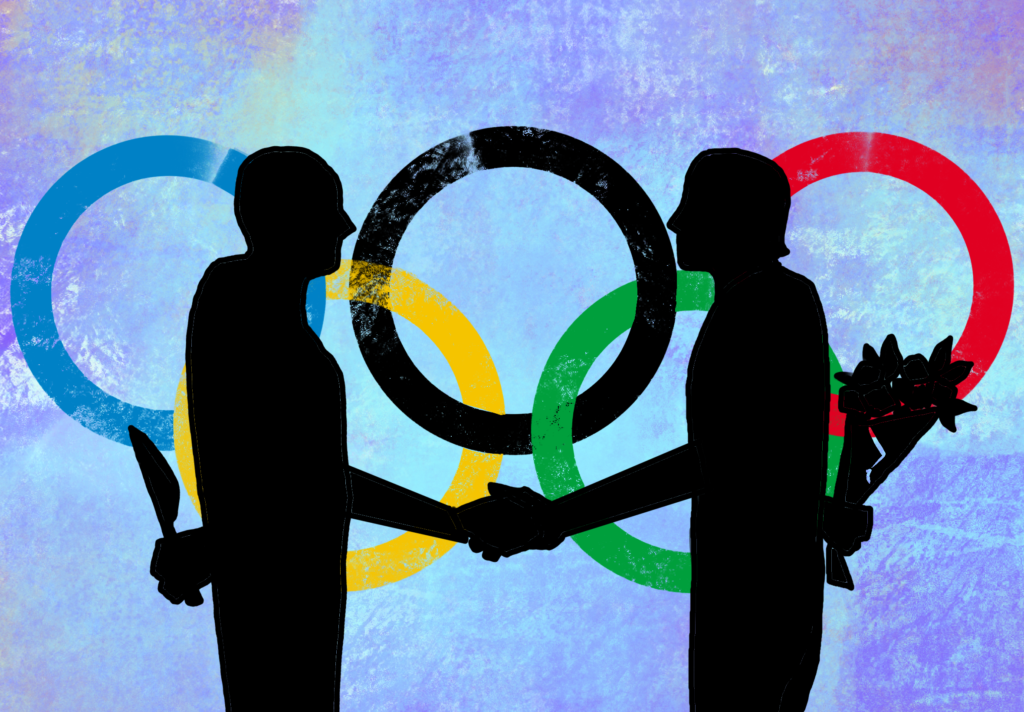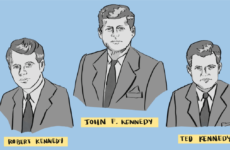
Graphic by Evelyn Kim ’25/The Choate News
By Sienna Kim ’28
Since it was revived in 1896, the Olympics has held people’s attention in a tight grip, with the Tokyo 2020 Summer Games reaching a global broadcast audience of more than 3,000,000,000. Because of its appeal to viewers of all ages and its capacity to deliver unparalleled athleticism, nationalism, and pride, the Games have always had immense power over the public. The wielding of such power becomes an issue when the International Olympic Committee (IOC) employs its influence to undermine unity, spark international tension, and impose beliefs on its viewers.
The Olympics is built upon the idea that every nation, regardless of race, age, and belief, deserves an equal chance of returning home with a bright gold medal. The Games are a celebration of not only athletic prowess but also of the athletes around the world who dedicate their lives to a moment that only arrives every four years.
However, this mission is threatened by complications, such as certain countries being boycotted or being barred from competition due to conflicts unrelated to the Olympics. By propagating certain ideas and condemning others, the IOC risks worsening political relations amongst both national leaders and Olympic athletes, simultaneously skewing global audiences’ perceptions of foreign powers. Morality is a fickle idea, and when burdened by centuries of histories and cultures from all around the world, it becomes nearly impossible to create a concrete definition of what should be considered permissible. Thus, it’s absurd for the IOC to decide on their own accord what they deem good or bad. Issues within our societies are complex, and oversimplifying these problems by holding certain countries accountable while authorizing others evokes unnecessary animosity.
The event’s history has long been political, from perpetuating Nazi propaganda throughout the 1936 Summer Olympics in Berlin to prohibiting Germany from participating in the 1948 Summer Olympics in London (per their involvement with the Axis Powers during the Second World War).
It’s difficult to disregard all of the contributions that the IOC has made to political discourse, whether it’s by restarting dialogue between the United States and North Korea after the latter’s invitation to the 2018 Winter Games in Pyeongchang, or banning South Africa from the event up until the 1992 Summer Olympics in Barcelona for Apartheid. This practice sets a dangerous precedent in which the narratives presented at each Olympics will heavily depend on which country is hosting.
As one of the world’s most coveted sporting events, the Olympics’ primary goal must be to highlight athletic talent. When host countries begin to stray from this goal by banning nations from competing due to their political beliefs and miscellaneous “red flags” that are unrelated to the Games, they jeopardize this event’s fundamental mission.
Athletes and their years of blood, sweat, and tears are robbed of the attention they deserve due to the IOC’s’ selective negligence. When politics dominate the narrative, athletes’ amazing feats are pushed aside and replaced by hot topics and buzzwords that fuel the media and controversy, backpedaling on the Olympics’ goal to create a platform for athletic excellence.
The IOC cannot continue to allow countries and athletes to promote their own political ideals. They must stop fueling the flames that divide us and instead encourage unity and pride in our country’s staggering athletes. Otherwise, the Olympics risks rusting their medals for human achievement in the name of clashing political beliefs.




